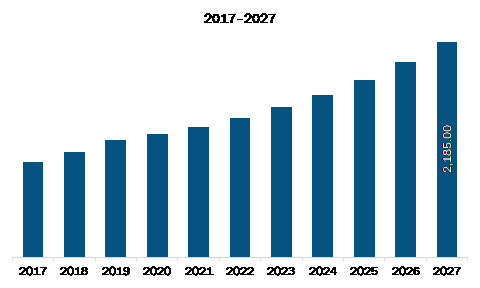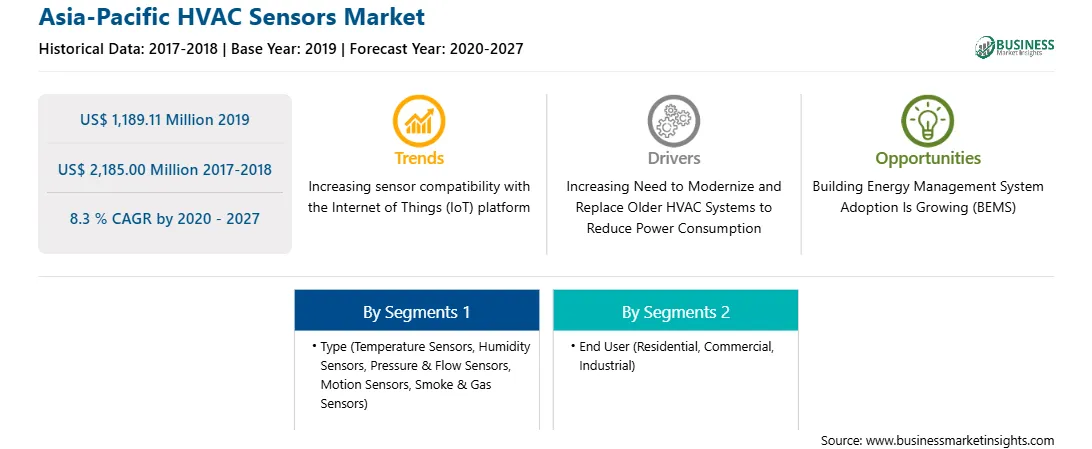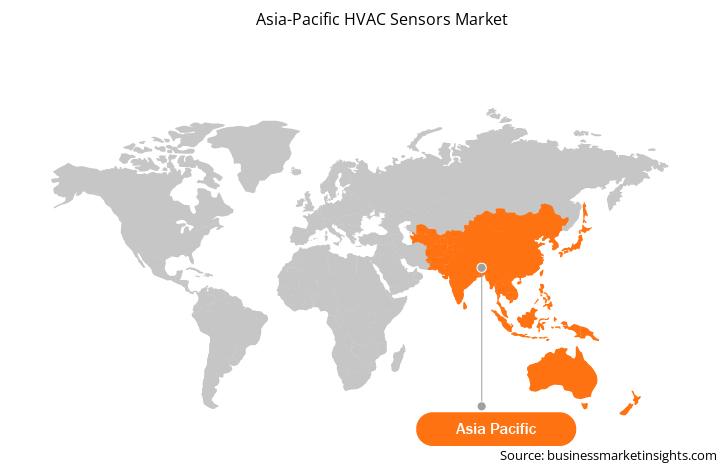Rising disposable income in developing countries, especially in India and China is leading to a large client base for HVAC sensors to deploy in air conditioning, ventilation, and heating systems, which is driving the HVAC sensors market growth in the region. China is a leading manufacturing hub for HVAC sensors, while India and Japan are also considered significant contributors to the regional market growth. Various APAC countries are characterized by the mass production of HVAC sensors required for residential, commercial, and industrial applications. Rising number of manufacturing companies in India and China owing to the availability of skilled human resources is driving the HVAC sensors market growth. Moreover, an increase in sales of HVAC systems for the commercial segment and advancement in HVAC sensors support the market growth. Further, the presence of leading HVAC sensors manufacturing companies such as Mitsubishi Electric Corporation and Johnson Controls–Hitachi Air Conditioning is augmenting the market growth. For instance, in October 2019, Johnson Controls–Hitachi Air Conditioning company invested US$ 22.5 million in India to form a new global development manufacturing center for the production of HVAC systems for commercial and residential segments. Such development from the market players is driving the market growth. Further, surging establishment of smart cities and rise of smart, connected, and energy efficient IOT-enabled HVAC systems are the major factor driving the growth of the APAC HVAC sensors market.
Furthermore, in case of COVID-19, APAC is highly affected specially India and China. The governments in APAC countries have taken several crucial steps to contain the spread of virus by imposing lockdown and physical distancing norms, which has negatively affected the manufacturing sector. China has significantly large number of electronics and semiconductor manufacturing industry with numerous manufacturers operating and supporting several industries across the globe. The Chinese HVAC sensors market players have observed tremendous impact on respective business during Q1 of 2020, which have reflected stiff decline in revenue generation, which resulted in loss in China as well as APAC HVAC sensors market. In addition, China accounts for the significantly higher number of HVAC system manufacturers. The lockdown measures and physical distancing norms imposed by the Chinese government during Q1 has reflected huge fall in supply of HVAC systems, which ultimately resulted in decimation in revenue generation in the HVAC sensors market. Japan and India are the other two countries that have large number of electronics and semiconductor manufacturers as well as end users. Though the countries have eased the lockdown norms and have allowed the manufacturing plants to operate, the decrease in demand and supply has been severely affecting the HVAC sensors market player in both the countries. The recovery period is expected to be by late 2021 as the entire electronics and semiconductor manufacturing sector has been rigorously affected.

Strategic insights for the Asia-Pacific HVAC Sensors provides data-driven analysis of the industry landscape, including current trends, key players, and regional nuances. These insights offer actionable recommendations, enabling readers to differentiate themselves from competitors by identifying untapped segments or developing unique value propositions. Leveraging data analytics, these insights help industry players anticipate the market shifts, whether investors, manufacturers, or other stakeholders. A future-oriented perspective is essential, helping stakeholders anticipate market shifts and position themselves for long-term success in this dynamic region. Ultimately, effective strategic insights empower readers to make informed decisions that drive profitability and achieve their business objectives within the market.

| Report Attribute | Details |
|---|---|
| Market size in 2019 | US$ 1,189.11 Million |
| Market Size by 2027 | US$ 2,185.00 Million |
| Global CAGR (2020 - 2027) | 8.3 % |
| Historical Data | 2017-2018 |
| Forecast period | 2020-2027 |
| Segments Covered |
By Type
|
| Regions and Countries Covered | Asia-Pacific
|
| Market leaders and key company profiles |
The geographic scope of the Asia-Pacific HVAC Sensors refers to the specific areas in which a business operates and competes. Understanding local distinctions, such as diverse consumer preferences (e.g., demand for specific plug types or battery backup durations), varying economic conditions, and regulatory environments, is crucial for tailoring strategies to specific markets. Businesses can expand their reach by identifying underserved areas or adapting their offerings to meet local demands. A clear market focus allows for more effective resource allocation, targeted marketing campaigns, and better positioning against local competitors, ultimately driving growth in those targeted areas.

The APAC HVAC sensors market is expected to grow from US$ 1,189.11 million in 2019 to US$ 2,185.00 million by 2027; it is estimated to grow at a CAGR of 8.3 % from 2020 to 2027. Escalation in construction sector is expected to upsurge the APAC HVAC sensors market. The construction sector is experiencing a tremendous growth in developing economies across APAC region with a heavy investment in commercial construction as well as infrastructural and institutional developments such as railway stations, bus stations, airports, and educational institutions. This rapid growth of the construction sector is attributed to the rising urban population demanding better standard of living. Further, the rise in commercial construction such as shopping malls, recreational centers, cinema halls, and office building is boosting the installation of HVAC systems. Moreover, some of these economies are also planning to boost their industrial sector by offering favorable business environment to foreign investors and support to local industries. Made in China 2025, Make in India, are among the initiatives taken by governments to support industrialization. Moreover, several foreign players are relocating their manufacturing facilities to low-cost economies in APAC region, which is anticipated to propel the industrial construction. Since, HVAC system is one of the integral systems in construction process, the deployment of HVAC systems is likely to increase with the rising construction, driving the APAC HVAC sensors market.
In terms of type, the temperature sensors segment accounted for the largest share of the APAC HVAC sensors market in 2019. In terms of end user, the commercial segment held a larger market share of the APAC HVAC sensors market in 2019.
A few major primary and secondary sources referred to for preparing this report on the APAC HVAC sensors market are company websites, annual reports, financial reports, national government documents, and statistical database, among others. Major companies listed in the report are BELIMO AIRCONTROLS (USA), INC.; Emerson Electric Co.; Honeywell International Inc.; Johnson Controls, Inc.; Schneider Electric; Senmatic A/S; Sensata Technologies, Inc.; Sensirion AG; Siemens AG; TE Connectivity Ltd.
The Asia-Pacific HVAC Sensors Market is valued at US$ 1,189.11 Million in 2019, it is projected to reach US$ 2,185.00 Million by 2027.
As per our report Asia-Pacific HVAC Sensors Market, the market size is valued at US$ 1,189.11 Million in 2019, projecting it to reach US$ 2,185.00 Million by 2027. This translates to a CAGR of approximately 8.3 % during the forecast period.
The Asia-Pacific HVAC Sensors Market report typically cover these key segments-
The historic period, base year, and forecast period can vary slightly depending on the specific market research report. However, for the Asia-Pacific HVAC Sensors Market report:
The Asia-Pacific HVAC Sensors Market is populated by several key players, each contributing to its growth and innovation. Some of the major players include:
The Asia-Pacific HVAC Sensors Market report is valuable for diverse stakeholders, including:
Essentially, anyone involved in or considering involvement in the Asia-Pacific HVAC Sensors Market value chain can benefit from the information contained in a comprehensive market report.